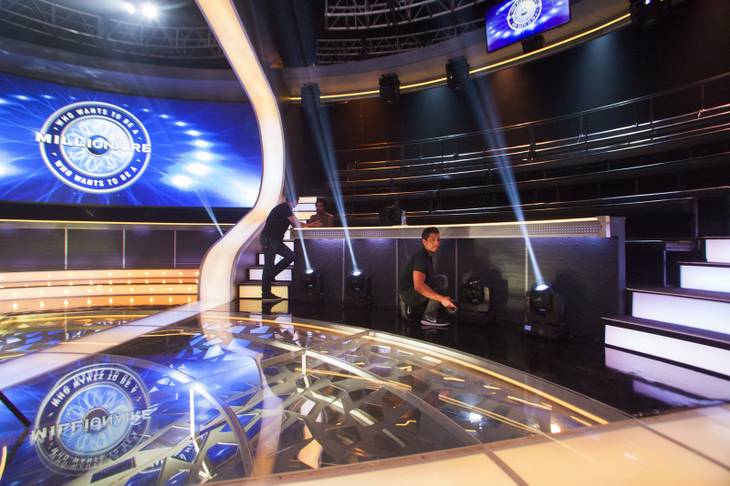Mist floats in the icy cold air as Amy Murray-Rolon, manager of Sidekick Productions, gives a tour of Caesars Entertainment Studios, the permanent movie and television soundstage Caesars built on a large vacant lot along Koval Road behind Bally’s Las Vegas.
Murray-Rolon, whose company manages the studio for Caesars, explained that the mist comes from the fog machines used for the game show “Who Wants To Be a Millionaire,” which has been shooting in the studio since the middle of June and ends production in a week or so.
The cool temperature is needed for events such as the inaugural Gears Pro Circuit Las Vegas Open, an esports competition the studio hosted shortly after it opened earlier this year, or game shows such as “Millionaire.”
A Sidekick technician explained that TV lights and audience members can significantly raise studio temperatures. But with its advanced AC system, he can bring the temperature down 30 degrees in 20 minutes.
The studio is made up of two spaces. The first, a 3,500-square foot area near the front, is used for audience staging but can host productions as well.
The second is 39,000 square feet and boasts 10,000 amps of clean power, a massive rigging system and an advanced heating/air conditioning system designed to work quietly. For movie and TV productions, controlling the sound is just as important as controlling the temperatures.
Murray-Rolon said the studio has clients, mostly television productions, booked well into next year. Among the reasons TV shows are attracted to Las Vegas, she said, is because it’s easy and relatively inexpensive to get audience members compared to other cities.
Studio officials also hope to house movie productions. Caesars Entertainment typically hosts more than 50 productions a year, usually for location shoots at its resorts.
Nevada offers tax credits to movie production companies, and Las Vegas has been a renowned movie setting for more than six decades.
Big-budget movies such as “Ocean’s Eleven” (2001) and “The Hangover” (2009), however, had to rely on temporary facilities because of a lack of production facilities such as Caesars’ studio when they were filmed.
While some gaming companies have in-house production teams and facilities, only Caesars has a facility specifically marketed to the movie and television industry, a spokesperson for the Nevada Film Office said.
Other casinos’ production facilities are smaller and designed for specific tasks.
The Palms, for example, has a professional recording studio that has been used by big-name artists, but it was built for audio production.
The Palazzo has had a broadcast studio since 2015 that can produce network TV, live radio remotes, and audio and video podcasts.
The South Point has two television studios, but they were built for the Vegas Stats & Information Network, a sports betting-media startup that features former sports broadcasting personality Brent Musburger. One studio is in the basement; the other is next to the South Point sports book.
Various MGM Resorts International properties have network connections, rooms and other infrastructure to handle broadcasts of sporting and entertainment events at T-Mobile Arena and its other venues. There’s also a small broadcast booth at the race and sports book at Mandalay Bay.
In addition to built-in audiences and tax credits, Las Vegas has other advantages that lure movie productions, Murray-Rolon said. It’s short flight to and from Southern California’s moviemaking mecca, and several video equipment-rental companies have warehouses in Southern Nevada, she said.

